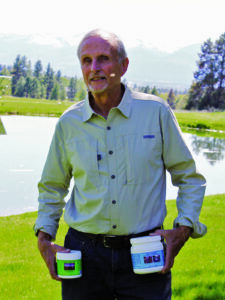
by Michael Howell
The Western Montana Conservation Commission (WMCC) was recently awarded $7 million dollars from the EPA Columbia River Basin Restoration Program to grant to local entities to host water quality education, outreach, cost-share programs, and community projects addressing toxic pollution reduction focused on septic leachate and stormwater concerns in Western Montana. The WMCC serves all communities west of the Continental Divide including the Bitterroot River watershed.
According to Heidi Fleury, one of two Grant Programs Specialists for EPA funds with the WMCC, “Applications for funds are tentatively set to open January 2nd, 2025 so now is the time to start planning and brainstorming.” She said funding will last through 2028-2029.
Local Environmental Specialist Ron Pifer, a Governor-appointed member of the WMCC representing the Lower Clark Fork and the Bitterroot, is excited about the funding prospects. According to Pifer, another $2.9 million is available in matching funds. In addition to serving as Bitterroot Basin representative on the WMCC, Pifer was also tapped by the Governor to serve on the Water Pollution Control Advisory Board to the Department of Environmental Quality.
As a young man, while working on his degree in Mechanical Engineering from Duke University, Pifer worked as a river raft guide in the Grand Tetons on the Snake River.
“You are in these beautiful mountains,” said Pifer. “You are seeing moose every day, all the birds and waterfowl, the osprey diving for fish and splashing your boat, bald eagles, and meeting people on their vacations having a good time. It was out of that that I decided to become an ecologist.”
It was while working on his PhD at University of Colorado-Boulder, and learning to do environmental reports, that the opportunity arose to do that as a profession and Pifer jumped at the chance. He began by managing reclamation projects for a surface mining operation and coal gasification plant in the Powder River Basin in Wyoming and continued writing reports and managing reclamation projects in 11 states before transitioning into aquaculture and working for Solar Aquafarms at the largest tilapia farm in the United States, producing up to 4 million pounds of tilapia wet weight annually. He managed the aquatic plants, aeration and bacteria at the solar greenhouses enclosing the fish farms.
It was when he landed in the Bitterroot Valley in 1992 and noticed the large number of ponds suffering from high algae growth that he decided to apply his extensive experience and opened his own seasonal business treating ponds and septic systems with probiotics, selling and applying a proprietary formula of bacteria to “eat the sludge” produced in septics and ponds, reducing the frequency of septic pumping and the growth of pond algae.
As part of his voluntary advisory work for the state, Pifer is currently working on a white paper examining and comparing the vetting process for biological additives to septics that have been adopted in the states of Florida, Massachusetts and Washington.
Pifer said that probiotics is a healthier alternative to the use of herbicides. He said the bacteria is non-toxic and reduces the need to use mechanical means to remove sludge and sediment from the ponds.
According to Pifer, the bacteria at work in septic systems is primarily coming from processed foods and a broader spectrum of bacteria is needed for optimal septage treatment. They also lack the surface area and aeration that good bacterial digestion requires.
He said the white paper he is working on, which he hopes to have finalized by this fall, can be used by DEQ, DNRC and the legislature in considering the best way to address the growing threat of groundwater pollution related to population and industrial growth in the state.
“Protecting the groundwater is not a political issue,” said Pifer. “Everybody wants clean water. I got involved in ecological work to make a difference in the world, to save and enhance habitat while at the same time allowing for industrial and societal development.”
For more information on Pifer’s business, Environmental Solutions – Natural Controls for Pond Algae, Fish Farms, Shrimp Farms & Septic Systems, visit www.environmentalsolutions.net